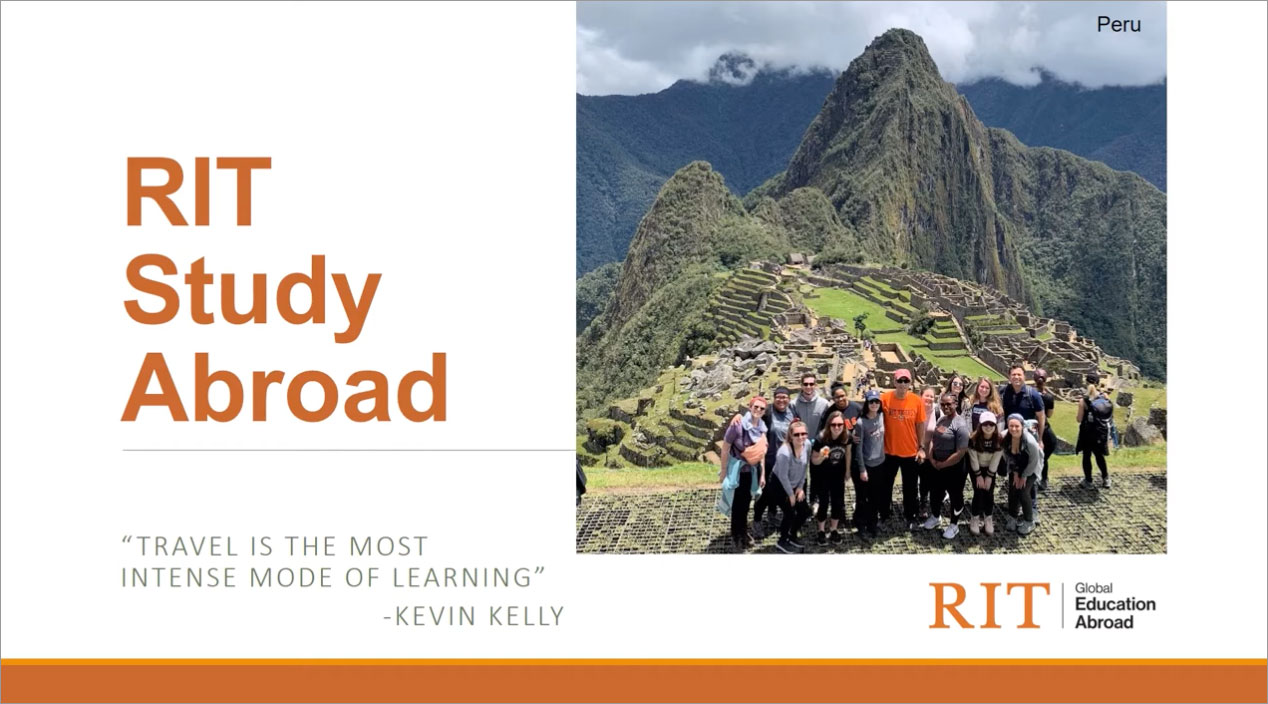Resources For Advisors
- RIT/
- RIT Study Abroad/
- Resources/
- Resources For Advisors
As an academic advisor, you play an integral part in helping students explore international experiences and have an important role in the internationalization of RIT’s campus.

Some other prompting questions to get the conversation started may include:
- Do you think that study abroad might be an enhancement to your experience here at RIT? (If so, how? If not, why?)
- What skills might you gain from a study abroad experience?
- Did you know that studying abroad is an option for students in every major at RIT?
Personalized Study Abroad Blueprint
The blueprint is a tool for students to use to help them understand their goals and priorities when studying abroad. The blueprint is available as a fillable PDF (click the link, then download/save it to your computer before filling it out). Working with your advisee on the blueprint can be a good first step in helping them explore study abroad. The blueprint includes resources to help students complete the plan, including links to articles and videos. Students are encouraged to bring their working blueprint when they meet with their study abroad advisor.
Download the Study Abroad Blueprint
Study Abroad for Diverse Students
All students have the opportunity to study abroad if they choose. The RIT Education Abroad office works closely with program providers, institutions abroad, campus departments, access services and other resources to help students access necessary accommodations, prepare for their program and succeed abroad.
Timing
Students who begin planning earlier for study abroad benefit from greater program choices and more funding opportunities.
Advisors who bring up the conversation early on benefit from clearer student experience expectations, streamlined administrative planning and less anxiety.
The Study Abroad pathways and college info sheets are a great resource for starting the conversation. These resources are available in the Additional Tools and Resources section of this page.
The Education Abroad office is open to joining advisors and their advisees in an advising meeting. Please contact Roseanne Hernandez at Roseanne.Hernandez@rit.edu.
How a student should get started
After meeting with their academic advisor, a student should:
- Utilize the Additional Tools and Resources section section of this page to get an idea of program options for their major.
- Make an appointment with a study abroad advisor.
- Login to the Compass database to create a profile, search programs and start an application.
Assisting Students
As an academic advisor, you play an integral part in helping students explore international experiences and have an important role in the internationalization of RIT’s campus. Since students often have more regular contact with advisors than study abroad staff, advisors can be the biggest advocates for international experiences.
Last year, RIT students who studied abroad said that academic advisors were one of the top three ways they found out about study abroad or their specific study abroad program - your encouragement and support makes a difference!
Roles/Ways to Assist Students
|
Stage |
Academic Advisor’s Role |
Study Abroad Advisor’s Role |
|---|---|---|
|
Exploratory |
|
|
|
Application Process |
|
|
|
Confirmed Participation in Study Abroad |
|
|
|
Returning from Study Abroad |
|
|
Study Abroad Application Process for Students
Students will work with several different RIT departments and contacts when applying for study abroad - RIT study abroad advisor, academic advisor, financial aid, faculty program director (if interested in a faculty-led program), and Access Services (if applicable). An RIT study abroad advisor will walk them through the application process.
Understanding our Programs
Global Campus Programs
RIT has five international campuses in which a student can directly enroll. The campuses are located in Dubrovnik, Croatia; Zagreb, Croatia; Dubai, United Arab Emirates; Pristina, Kosovo; and Weihai, China. Students can enroll for a semester or academic year and special programming options are often offered during the summer or winter break. These campuses follow a similar academic calendar as RIT and the courses are RIT courses. Students will take classes alongside local students allowing them the opportunity to work in diverse teams. Students will pay RIT tuition and receive letter grades.
The course descriptions for classes offered at RIT Global Campuses can be found on SIS. Change the location at the bottom of the SIS search page to the appropriate campus to display the course offerings. The course offerings for the Global Campuses are typically released later than the course offerings for RIT Rochester. However, the course offerings are fairly consistent from year to year, so it is appropriate to use the previous year’s course offerings as a tentative list.
Ideally, study abroad students are taking courses abroad that are equivalent to a required RIT course or an appropriate fulfillment for an RIT academic obligation. Therefore, students are fulfilling academic program requirements and staying on track to graduate on time. Students may also choose to take courses that interest them and that they might not otherwise have the opportunity to take, but these courses may not count towards their degree.
To ensure students are taking the appropriate courses and staying on track for graduation, we require them to meet with their academic advisor to discuss their course plans. Additionally, students should provide their RIT study abroad advisor with a list of courses they plan to take using the Global Campus Course Form.
The RIT Education Abroad office will register students for each course they take abroad through SIS (students will not be able to enroll themselves in the courses). As regular RIT courses with an RIT course number, there may be no indication that the course is study abroad other than the campus designation, for example “ENGL 210 – Literature, Culture and Media”.
Students will not receive a study abroad transcript. Instead, each overseas class will be graded individually by the RIT faculty member and the RIT faculty member will assign a US letter grade on SIS. All grades will be calculated into a student’s GPA.
Faculty-Led Programs
Faculty-led programs are designed by an RIT faculty member and are often project-based. The travel portion of the program is often short term and supplemented by on-campus meetings or a formal class. Sometimes the travel portion of the course may take place outside of the term in which the students actually earn credit for the experience. These programs feature a high degree of faculty mentorship, hands-on experiences and a cohesive cohort environment. Students will pay RIT tuition and receive letter grades.
The main contact for students interested in faculty-led programs throughout the application process is the faculty-director for the program. The Education Abroad office created a short video and a checklist to guide students through the application steps. Please share these resources with students interested in faculty-led programs.
Pertinent information about the study abroad course can be found online by the student in the Compass (the RIT Study Abroad application portal) or SIS, or by talking with the faculty member directly.
Ideally study abroad students are taking courses abroad that are equivalent to a required RIT course or an appropriate fulfillment for an RIT academic obligation. Therefore, students are fulfilling academic program requirements and staying on track to graduate on time. Students may also choose to take courses that they are interested in and perhaps couldn’t otherwise take but don’t count towards their degree.
In order to ensure students are taking appropriate courses and staying on track for graduation, we require them to meet with their academic advisor to discuss their course plans.
While students are overseas on a faculty-led program, they will be enrolled in their RIT class(es) as normal by a study abroad advisor or college administrator (students will not be able to enroll themselves in the course(s)). Students will receive letter grades for these classes and all grades will be calculated into their GPA. As a regular RIT course with an RIT course number, there may be no indication that the course is study abroad, for example “ENGL 210 – Literature, Culture and Media”. If students earn credit in one term and travel in another, they may earn an "I" (incomplete) for the course until the travel is complete.
Students will not receive a study abroad transcript. Instead, the RIT faculty member leading the program will grade the course(s) and input the grade(s) on SIS. All grades will be US letter grades and will be calculated into a student’s GPA.
Exchange Programs
RIT has developed a number of partnerships with institutions abroad which allow our students to directly enroll for a semester in exchange for an international student coming to RIT. These programs are typically a semester in length, discipline specific, and offer a high level of cultural immersion. Students have the opportunity to develop career skills through intense language learning and intensive problem solving. Students will pay RIT tuition and receive pass/fail grades.
Students peruse the course offerings available on the exchange university’s website to develop a tentative schedule of courses they plan to take abroad. Using the ‘My Coursework’ tab in the Compass, students will check to see if the courses they plan to take are listed in the Study Abroad Course Equivalencies database. If they are, students will simply add them to their ‘My Study Abroad Courses’ page. If not, they will use the ‘Request New Course Approval’ button on the ‘My Study Abroad Courses’ page to submit courses for review by the RIT Registrar. The review process can take up to six weeks.
Ideally, study abroad students are taking courses abroad that are equivalent to a required RIT course or fulfill another RIT academic course obligation. Therefore, students are fulfilling academic program requirements and staying on track to graduate on time. Students may also choose to take courses that they are interested in and perhaps couldn’t otherwise take, but don’t count towards their degree.
In most cases, students studying abroad on exchange programs cannot actually register for their courses until they arrive in country. As a result, courses may be full or no longer available. It is essential that students have alternate courses pre-approved and communicate with their academic advisor, study abroad advisor and financial aid advisor if they register for anything other than what they have on their ‘My Study Abroad Courses’ tab in the Compass. This is especially important if there is a change in the number of credits a student earns, as this can have significant implications, particularly for financial aid.
Students will be registered for study abroad classes at RIT (SAB 360 - International Exchange) for ## credits per class by an RIT study abroad advisor. Their RIT registration will match what is on their ‘My Study Abroad Courses’ tab in the Compass. Students will work with their study abroad provider and host institution to register for their actual overseas courses before they depart or as soon as they arrive.
Approximately three months following the completion of the program, the RIT Education Abroad office will receive an official transcript from the program provider detailing the courses students took abroad and the American letter grades they earned for each course. These grades will be converted to pass/fail. For each grade of a C or above, students will receive a passing grade. For a C minus, D, or F, students will receive a failing grade. Neither passing nor failing grades are calculated into a student's GPA. The RIT Education Abroad office will process the appropriate registration paperwork (i.e. change of grade form, enrollment correction) to assign a pass/fail grade for the classes taken abroad and send it to the Registrar’s Office. The updated grade will be displayed on SIS. It typically takes three months after the program ends to receive a transcript, so students and advisors should keep this in mind when planning for graduation certification, graduate school applications, and other related tasks.
If you have any questions about this process, please address them with study abroad advisor, Myles Chalue.
Affiliate Programs
Affiliate programs are facilitated by partner universities and organizations to enhance the variety of locations and course offerings available to students. They often offer a wide range of courses and broad-reaching cultural understandings. Students will pay the partner university’s tuition rate and receive pass/fail grades.
Students peruse the course offerings available on the affiliate partner's website to develop a tentative schedule of courses they plan to take abroad. Using the ‘My Coursework’ tab in the Compass, students will check to see if the courses they plan to take are listed in the Study Abroad Course Equivalencies database. If they are, students will simply add them to their ‘My Study Abroad Courses’ page. If not, they will use the ‘Request New Course Approval’ button on the ‘My Study Abroad Courses’ page to submit courses for review by the RIT Registrar. The review process can take up to six weeks.
Ideally, study abroad students are taking courses abroad that are equivalent to a required RIT course or fulfill another RIT academic course obligation. Therefore, students are fulfilling academic program requirements and staying on track to graduate on time. Students may also choose to take courses that interest them and that they might not otherwise have the opportunity to take, but these courses may not count towards their degree.
In most cases, students studying abroad on affiliate programs cannot actually register for their courses until they arrive in country. As a result, courses may be full or no longer available. It is essential that students have alternate courses pre-approved and communicate with their academic advisor, study abroad advisor and financial aid advisor if they register for anything other than what they have on their ‘My Study Abroad Courses’ tab in the Compass. This is especially important if there is a change in the number of credits a student earns, as this can have serious implications, especially on financial aid.
Students will be registered for study abroad classes at RIT (SAB 362 - Study Abroad) for ## credits per class by an RIT study abroad advisor. Their RIT registration will match what is on their ‘My Study Abroad Courses’ tab in the Compass. Students will work with their study abroad provider and host institution to register for their actual overseas courses before they depart or as soon as they arrive.
After students arrive abroad, they will need to send a copy of their final schedule to their RIT study abroad advisor to confirm their registration. Their registration will be finalized based on the course approval received for each course in the 'My Study Abroad Courses' tab in the RIT Compass.
Approximately 3 months following the completion of their program, the RIT Global Education Abroad office will be sent an official transcript from the student's affiliate provider detailing the courses they took abroad. Students may be required to obtain an official translation of their transcript (both in English and American credits) if needed. Once the student's study abroad transcript is received, the grades will be converted to pass/fail. For each grade of a C or above, students will receive a passing grade. For a C minus, D, or F, they will receive a failing grade. Neither passing nor failing grades are counted into a student's GPA.
If you have any questions about this process, please address them with Study Abroad Advisor, Roseanne Hernandez.
Independent Study Abroad
On occasion a student is not able to find a study abroad program among our many RIT approved programs and they choose to study abroad independently. The student may need to take a brief leave of absence from RIT and the student will be transferring in the study abroad credits. We encourage these students to still meet with the Education Abroad office to ensure they are completing all application steps. These students are not eligible for any financial aid and should work with their advisors and the Registrar’s Office to ensure that the courses they take abroad can be transferred into RIT and count toward their degree requirements. Students who earn a C- or below will not be able to transfer in the courses.
Funding Study Abroad
Funding is one of the most important factors in study abroad decision making. Often students assume that studying abroad is cost prohibitive or is more expensive than studying at RIT. However, study abroad costs vary dramatically by program due to length, number of courses, location, etc. As a part of the application process, the Education Abroad office will provide students with a detailed budget worksheet outlining the actual and estimated out-of-pocket costs of studying abroad. Students may be eligible to use federal and/or RIT aid to help fund their experience. There are also many study abroad scholarships available from program providers, national organizations and even RIT.
Overcoming the Barriers
Traveling abroad may lead to feelings of fear and insecurity. The influence of family and friends who have experience traveling overseas can be very influential as well. In addition, with a number of highly technical majors at RIT, students are often concerned about the course offerings overseas and the impact studying abroad may have on their graduation date.
Other concerns include:
Finances
Students who attend an RIT-approved program and maintain full-time status while abroad (take a minimum of 12 semester credits) are eligible to use their financial aid to assist with study abroad expenses. Scholarship funding is also available through affiliate providers and outside organizations.
- RIT Study Abroad Scholarships: RIT college and department scholarships that can support a study abroad program of your choice
- National Study Abroad Scholarships: Nationally competitive scholarships that fund a study abroad program of your choice.
- Affiliate Scholarships: RIT affiliate partners offer scholarship funding when applying to their programs
- Funded Programs: Competitive international programs to study, research, learn a language, or intern abroad that are mostly or fully funded.
All students will receive a customized budget worksheet for their program of interest, which outlines all expenses they can expect to incur during the program. This is a tool they can use when discussing program costs with the Financial Aid Office and/or determining if the program is a viable option for them.
Fear of the Unknown
In addition to talking with a study abroad advisor, students can connect with one of our Global Ambassadors who have returned from study abroad and can provide a student perspective on the experience.
A pre-departure meeting is required for all students who study abroad. This meeting addresses a number of common fears and questions about traveling overseas, including culture shock, health and safety and packing tips. Our study abroad Global Ambassadors are also at the meeting to speak to prospective students about their experience overseas and what recommendations they have for attending a study abroad program.
Upon arrival abroad, all students will participate in a thorough orientation which often includes activities such as an airport pickup, a tour of the city, a welcome dinner and introductions to faculty and staff. All programs have an in-country main point of contact, such as a resident director, who can address any issues that arise while the student is abroad. RIT’s Risk Management office serves as another source of support as it reviews all program locations and closely monitors all overseas situations.
Family
The RIT Education Abroad office has developed resources for parents that covers a number of common questions and concerns regarding studying abroad. The application process, financing study abroad, grades and credits as well as practical preparations are covered in the guide. Family members are also welcome to contact the Education Abroad office directly with any questions.
Learn more about resources for parents
Academics
RIT Education Abroad has developed college-specific info sheets available from the Additional Tools and Resources section of this page to assist students and advisors with researching studying abroad programs that fit within a particular field of study. These info sheets highlight the benefits of studying abroad for a particular career path, identify overseas programs that provide course offerings that align with specific majors, and highlight past student successes on overseas programs. In addition, the study abroad pathways developed by each college help students in each major identify an ideal time to study abroad and graduate on time.
Advisor Compass Login
The Advisor Compass Login is used in the study abroad course approval process. With the Advisor Compass Login, you can perform the following tasks:
- Access the Study Abroad Course Equivalencies database
- Request a new study abroad course approval
- Check the status of existing study abroad course approvals for your students
You can access the Advisor Compass Login with your RIT username and password.
A login is not required to access the Study Abroad Course Equivalencies database, only to check the status of an existing study abroad course approval request or request a new study abroad course approval on behalf of a student.
Resources/Instructions
- Recording of RIT CPD Workshop on the new study abroad course pre-approval process (August 2021)
- How to access the Study Abroad Course Equivalencies database
- How to check the status of a student's study abroad course pre-approvals
- How to get a screenshot needed for course substitutions
- Student Task - How students request a new course approval
Questions: Contact study abroad advisor, Roseanne Hernandez (rmdrap@rit.edu or x5-7629)
Additional Tools and Resources
College Info Sheets
Highlight major/college specific study abroad information such as the best time to go and popular programs. Please be advised that these information sheets only list a handful of suggested programs and are not the only programs available. For a complete list of programs, students should login to the Compass to search all available programs.
- College of Art and Design
- College of Engineering Technology
- College of Health Sciences and Technology
- College of Liberal Arts
- College of Science
- Golisano College of Computing and Information Sciences
- Kate Gleason College of Engineering
- NTID
- Saunders College of Business
Student Application Checklists
Students can use these checklists as a guide to the steps they need to take when applying for study abroad.
-
Global Campus Programs Checklist
Faculty-Led Programs Checklist
Independent Study Abroad Checklist
Personalized Study Abroad Blueprint
The blueprint is a tool for students to use to help them understand their goals and priorities when studying abroad. The blueprint is available as a fillable PDF (click the link, then download/save it to your computer before filling it out). Working with your advisee on the blueprint can be a good first step in helping them explore study abroad. The blueprint includes resources to help students complete the plan, including links to articles and videos. Students are encouraged to bring their working blueprint when they meet with their study abroad advisor.
RIT Global Contacts
The RIT Education Abroad office is happy to assist students, staff and faculty with any questions that arise regarding study abroad programs and our global campuses. Below is a list of our office staff and how they commonly work with academic advisors.
Oversees education abroad program development, strategic initiatives, opportunities to increase accessibility and part of the international emergency response team.
Education Abroad office liaison to academic advisors and participates in Advisor's Council. Main contact for issues, opportunities and student advising for affiliate programs, including registration, grading and transcripts.
Main contact for issues, opportunities and student advising for outbound students to RIT global campus and exchange programs, including registration, grading and transcripts.
Main contact for study abroad program marketing, events, and billing for affiliate programs.









